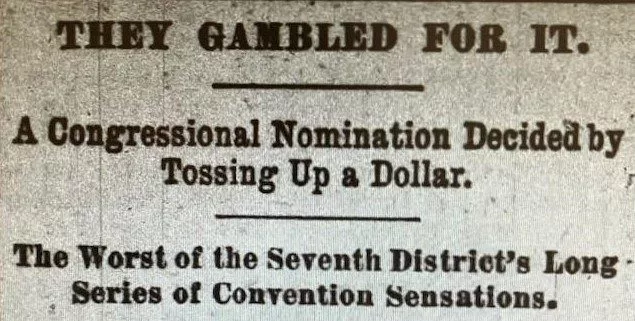
Editor’s note: Following is the fifth part in a story series by contributing writer Brent Engel.
Political nominee chosen in unusual way
Many viewed it as an arbitrary and disgraceful way to decide an election.
Democrats used a legal – but controversial – coin toss to choose an 1888 congressional candidate in Missouri’s Seventh District, which covered Pike and seven other counties.
The method had been used in politics before and is still used today. But it led to disagreements, name-calling and regrets while giving Republicans fodder over which to salivate.
“Missouri has often sent weak and undeserving men to Congress, but she has never thus honored one who owed his nomination to an act of deliberate and shameful gambling,” the St. Louis Globe-Democrat criticized.
The leading candidates were Lincoln County attorney Richard Norton and Pike County Judge Elijah Robinson. They knew and disliked each other. Both had sought the nomination before. However, their best chance came in 1888.
Three months before the party’s nominating convention, incumbent John Hutton announced he would not seek re-election. The Audrain County lawyer, doctor and owner of The Weekly Intelligencer newspaper did not publicly offer a reason, but critics in his own party said he had done little to help the district.
The convention began Aug. 28 in Warrenton. The district often was called “The Bloody Seventh” due to past political battles. Perhaps it was blind optimism, but the Clarksville Sentinel hoped the 1888 gathering would be different.
“What we desire to see is the best of feeling between the friends of the candidates, both at home and in the district, that (Democrats) may stand with serried ranks and unbroken phalanx and with their spears turned towards the enemy, rather than to witness hostile factions preparing to tear and rend each other,” it counseled.
Hutton’s paper, The Intelligencer, was right when it predicted “an ugly partisan feud.” After 108 ballots, Robinson had more delegates than Norton, but three short of what was needed. There was talk of re-nominating Hutton.
“It looks like a deadlock, but a deadlock till doomsday would be better than the re-infliction of the present incumbent, Mr. Hutton,” the Globe-Democrat chimed. “Why Mr. Hutton was ever elected to Congress is a secret which, for some inscrutable purpose, Divine Providence has not yet revealed to mortal man – not even to Mr. Hutton.”
Political operative and Lincoln County lawyer Nat Dryden quickly suggested a coin toss.
At that point, the story descends into trite arguments. Besides the candidates, the only other witnesses were Dryden and Robinson’s friend, former state lawmaker and Montgomery County Prosecuting Attorney Solomon Hughlett.
There was disagreement over whether a silver dollar or a penny was used and if two flips were made instead of one. Some reports indicated Norton called “heads” while others said he hollered “tails.” There were also questions about whether the loser received $1,000 or walked away empty-handed.
Dryden maintained the coin was a penny, and that he had flipped it. The showdown took place behind closed doors above a store across from the Warren County Courthouse.
Some accounts say the two candidates each got a chance to toss it and that Robinson lost both. Robinson supporters later claimed – without proof – that the coin featured “heads” on each side.
Many delegates were angered that they’d not been told about the flip until after it had happened.
“The people have had enough of this sort of democracy,” the Fulton Daily Sun-Gazette declared.
Robinson officially lost when Pike County inexplicably switched its 13 votes to Norton, who, in his acceptance, left blowhard candidates everywhere aghast.
“I am in that frame of mind, I am so deeply touched, I am so sincerely thankful that I wouldn’t have the ability, if I had the desire, to make a speech,” he blurted.
Robinson was not about to keep his mouth shut. While cordial, he immediately had second thoughts, saying that “in sheer desperation, I did that which my deliberate judgment convinces me was a mistake. I regret it very much, not only on my own account, but on account of my many warm friends.”
Robinson believed he had “committed an error,” but “there was no moral turpitude in it – it was simply a rash and ill-advised act.”
Both men denied money was involved. The alleged $1,000 payment to the loser would be worth $40,000 today.
“It fell to my lot to withdraw, and I did it, but I can assert with a clear conscience that I did not receive, either directly or indirectly, one cent,” Robinson said.
Norton later released a statement echoing Robinson’s words. The judge challenged critics to prove that he was “guilty of a single dishonorable or disreputable act,” and concluded by saying he thought a better answer than a coin toss would have been a primary.
A version of the idea, rejected by party leaders in 1888, would benefit a Pike County politician in just four years.
Next time: Ridicule and redemption.
CUTLINE FOR PHOTO:
A headline on Page 1 of the St. Louis Globe-Democrat on Aug. 30, 1888.